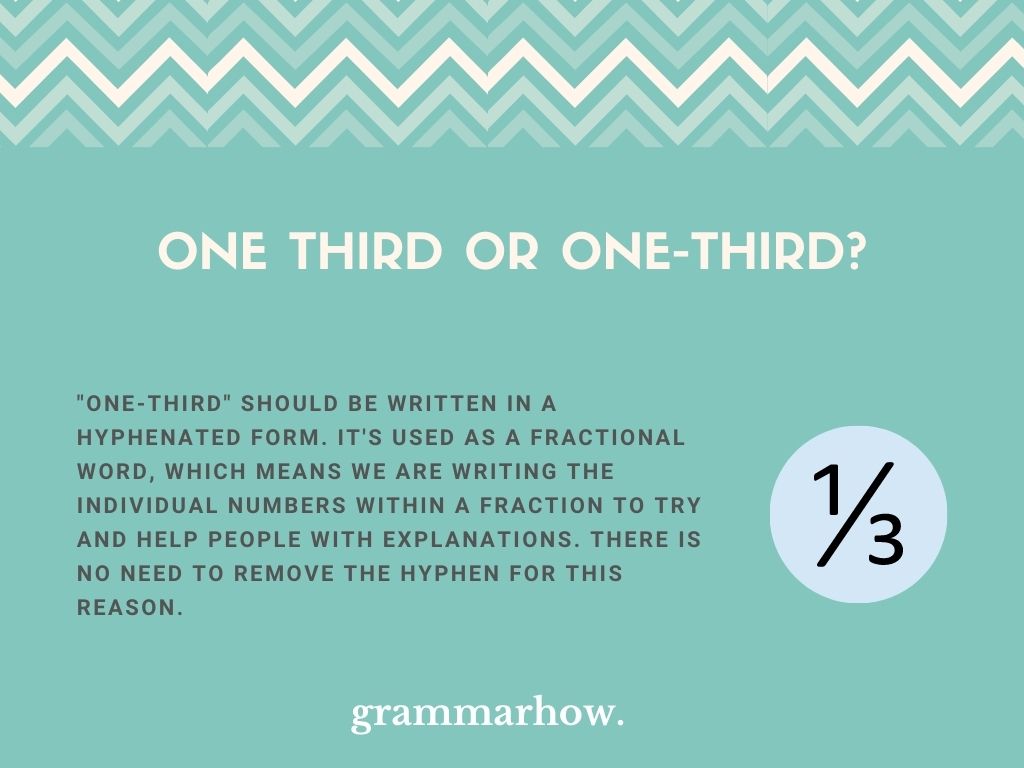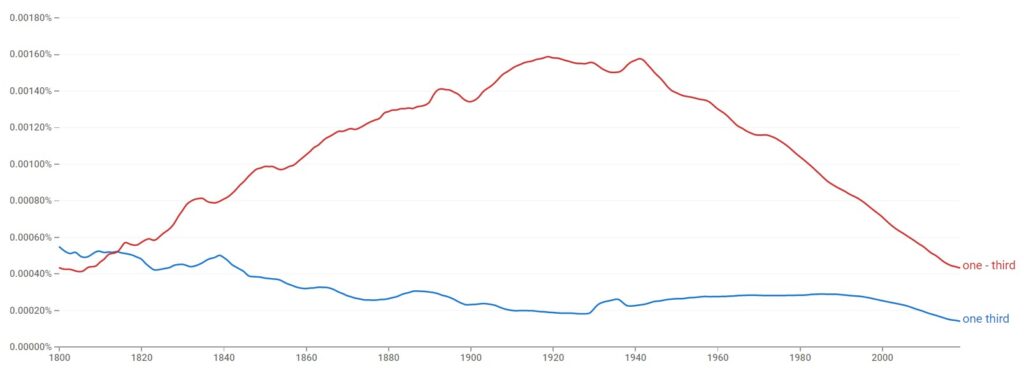“One-third” is a fractional word. We use it mostly to split something into three equal parts. However, do we need to write it hyphenated? It might be better to split it into one or two words if it seems appropriate, right? This article will help you understand that question.
One third vs. One-third
“One-third” should be written in a hyphenated form. It’s used as a fractional word, which means we are writing the individual numbers within a fraction to try and help people with explanations. There is no need to remove the hyphen for this reason.

According to Google Ngram Viewer, “one-third” is correct. We use it more often than we use the separated variation of “one third.” Most native writers would prefer to include the hyphen because it aids with readability while trying to explain it.

Unfortunately, there are no direct dictionary definitions since it’s a fractional word that refers to a mathematical element. Neither The Cambridge Dictionary nor The Oxford Dictionary has a definition suited to “one-third” or “one third.”
However, it is accepted that “one-third” is the correct form to use. There are instances where people split up the word, but since the fraction is already understood, there is no need to remove the hyphen.
One third
“One third” should not be written as two words. It’s not common to see because people already understand that it refers to having one equal part of something split into three. Since we accept there should be a hyphen, we do not need to drop it in standard English.
So, why does this happen? Well, as we said, there isn’t a direct and official spelling variation for the phrase. All that we can work with is common sense and what we see more often than not.
There is no need to remove the hyphen because it helps us to establish a fraction in our writing. Some people think it might be smart to remove it because it’s redundant, but they would be going against the normalities of English and the rules we expect to see.
Hopefully, these examples will help to clear things up:
- Correct: I would appreciate it if you could give me one-third of the company.
- Incorrect: Have you got one third of the items available for me to take away today?
- Correct: I need one-third. That’s my final offer, and I think you should take it.
- Incorrect: Give me one third. Then I’ll know whether you’re serious about doing business with me here.
One-third
“One-third” is a hyphenated form. It’s correct to write it in this way because every native speaker will understand that you’re writing about a specific fraction. There is no reason to drop the fraction because it will not help us with our explanations.
While some people believe the hyphen to be obsolete, it actually works really well to explain more of what we’re talking about. We need to keep it in place when we want to show someone that one equal part of three things is being used.
Perhaps some of these examples will help you to understand more about it:
- One-third of our profits have been drained. It’s not something we want to see happen again.
- I took one-third of the proceeds and gave them to charity. I think it was worth doing that.
- You should have looked into one-third of shares. Then you would have more sway on the board.
- I could have given you one-third. However, you’ve annoyed me now, and I don’t want to do that.
As you can see, it just looks better when written with a hyphen. It’s common for English language rules to develop based on what feels right or what looks better, which is why we think it’s important to highlight this hyphenated rule.
Is “Third” Capitalized In The Word “One-Third”?
“One-third” is not a proper noun, so we do not need to capitalize any part of it. There is no reason to capitalize “third” if “one” isn’t capitalized. However, if you write it in a title, you might find that it’s useful to capitalize both parts of the hyphen to suit your style.
If you choose to capitalize all other words in a title, there is no reason why you shouldn’t be able to capitalize both parts of the hyphen.

Martin holds a Master’s degree in Finance and International Business. He has six years of experience in professional communication with clients, executives, and colleagues. Furthermore, he has teaching experience from Aarhus University. Martin has been featured as an expert in communication and teaching on Forbes and Shopify. Read more about Martin here.
